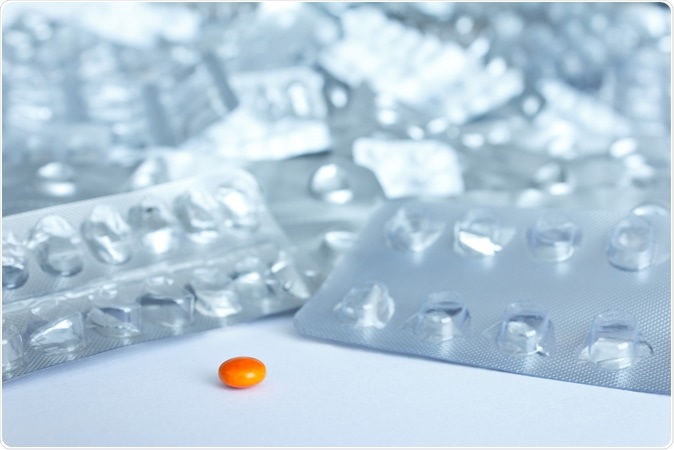Common drugs used in high blood pressure, heart failure, and diabetic patients with kidney damage, including angiotensin-converting enzyme inhibitors (ACEIs) and angiotensin receptor blockers (ARBs), could be protective in patients with COVID-19.

Image Credit: Agenturfotografin / Shutterstock
Why this controversy?
Severe acute respiratory syndrome coronavirus 2 (SARS-CoV-2) infection that causes COVID-19 disease is known to infect humans by infecting host cells through ACE2 receptors.
ACE or angiotensin-converting enzyme type 2 (ACE2) is an enzyme that converts internal body chemicals angiotensin I to angiotensin II in the lungs and other tissues and various organs of the body. This enzyme is blocked by ACE inhibitors such as Enalapril, Captopril, Lisinopril, etc. The final action of the angiotensin II occurs via its binding to the angiotensin receptor. The ARBs such as Telmisartan, Olmesartan, Losartan, Irbesartan, and Candesartan are known to block this receptor and prevent this binding. These drugs are said to be inhibitors of the Renin-Angiotensin-Aldosterone system, explain the researchers.
There have been differing opinions regarding the safety of these drugs in COVID-19 positive patients. Some experts believe the use of these drugs may increase the risk of severe disease and increase the susceptibility to the infection, while others believe, these drugs could be protective.
What happens to the virus?
The researchers in this study explain that SARS-CoV-2 can penetrate the cells of the host using ACE2, but they also need “type II transmembrane serine proteases (TMPRSS2)” which can prime their spike proteins to allow this entry. When the virus binds to the ACE2 using its spike protein, the former causes a conformational change in the protein. This can then be digested by the TMPRSS2. This digestion helps the viral envelope to fuse with the cell membrane and thus enter into the cell. They explain that a drug called Camostat Mesylate has been known to inhibit the protease TMPRSS2. This drug could be a possible treatment for the COVID-19 infection, they wrote.
What was done?
The team writes that COVID-19 causes Severe Acute Respiratory Syndrome, and this has caused a pandemic affecting populations of six continents. They explain that different professional health organizations have already issued statements and guidelines that suggest that there is no evidence that the use of ACEI and ARBs could affect the management of blood pressure in patients with COVID-19.
For this study, they looked at around 60 published studies and the evidence available.
What was found?
The team wrote that some studies say that raised levels of ACE2 might increase the severity of COVID-19 infection, and thus use of ACEI and ARBs could raise the risk of the severity of the infection and worsen its course. They, however, add that not all of the ACEI and ARBs can increase the levels of ACE2. On the other hand, raised blood pressure can surely damage the outcome of a patient with COVID-19, they explained.
The team explains that raised levels of Angiotensin II can decrease the activity of ACE2 on the surface, as is seen in animal studies. They write that this is via an “AT1Rdependent internalization mechanism”. Losartan, however, can block this internalization. They write, “it remains unknown whether preventing ACE2 internalization would be effective at attenuating infections by SARS coronaviruses, and further studies are urgently needed to clarify this mechanism.”
Experts have agreed that serum levels of Angiotensin II are raised in patients with COVID-19 compared to those who are non-infected. This rise could also be associated with an increased load of the viral particles in the body and severe lung disease. They wrote that raised Angiotension II could result in progressive lung damage to lead to ARDS (Acute respiratory distress syndrome) that may prove to be fatal for the patient.
Co-author Carl J. Lavie, MD, of the John Ochsner Heart and Vascular Institute, Ochsner Clinical School - University of Queensland School of Medicine, New Orleans, LA, USA, said in a statement, “Angiotensin II is known to foster inflammation, oxygenation, vasoconstriction, and fibrosis, so it is quite conceivable that a pharmaceutical agent that can inhibit the production of this hormone could actually be very beneficial for preventing lung injury and also for systemic health. Certainly, it is premature right now to start these agents as a preventive measure for COVID-19 in patients with no other indicator for RAAS inhibitors. However, this is an active area for investigation.”
Angiotensin-Converting Enzyme 2 and Anti-Hypertensives in COVID-19
Conclusions, Recommendations and future directions
Lead author Fabian Sanchis-Gomar, of the Department of Physiology, Faculty of Medicine, University of Valencia and INCLIVA Biomedical Research Institute, Valencia, Spain; and Division of Cardiovascular Medicine, Stanford University School of Medicine, Stanford, CA, USA, said in a statement, “In agreement with current guidelines, we recommend patients with hypertension should continue taking anti-hypertensive medications without interruption.” The team concluded that there had been no studies that state that ACEI and ARBs can raise the levels of ACE2 in the body and thus raise the risk of severe disease in COVID-19 positive patients. Dr. Sanchis-Gomar said, “ACEIs or ARBs therapy should be maintained or initiated, as indicated, in patients regardless of COVID-19.” He added, “Given the equal efficacy but fewer adverse events, ARBs could potentially be a more favorable treatment option in COVID-19 patients at higher risk for developing severe forms of the disease.”
The team wrote that there was a potential for alternative therapies for COVID-19, including “recombinant ACE2, Ang 1-7 peptides, angiotensin II receptor inhibitors, and potentially aldosterone synthase inhibitors”. These could mitigate the lung injuries caused by the virus. They write that the effects of these drugs, “is entirely unknown at present and requires consideration and investigation for a disease for which current care is entirely supportive.”
Journal reference:
- Angiotensin-Converting Enzyme 2 and Anti-Hypertensives (Angiotensin Receptor Blockers and Angiotensin Converting Enzyme Inhibitors) in Coronavirus Disease 2019 (COVID-19), Fabian Sanchis-Gomar, MD, PhD; Carl J. Lavie, MD; Carme Perez-Quilis, MD, PhD; Brandon M. Henry, MD; Giuseppe Lippi, MD, Mayo Clinic Proceedings, https://els-jbs-prod-cdn.jbs.elsevierhealth.com/pb/assets/raw/Health%20Advance/journals/jmcp/jmcp_ft95_3_5-1585588116123.pdf